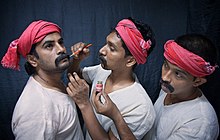維持活動安全/視覺素材
| 目錄:維持活動安全 / 視覺素材 |

您所參與的會議會有一份友善空間方針。友善空間方針特指參與者必須遵守的一系列指引,使其在活動中實現無騷擾的體驗。這意味著當所有參與者參與討論時,必須考量到脈絡與背景、文化差異、經驗、支援以及影響。
一般來說,本方針禁止相關具攻擊性的口語評論:
|
|
本方針也禁止下列行為:
|
|
If you witness something you believe goes against the Friendly Space Policy, there are a few courses of action you can take.
These depend on the severity of the incident.
Your first point of contact should be the event coordinators—it's their job to help deal with Friendly Space Policy violations when they emerge. They can help you figure out the next steps towards addressing the issue.
You may be able to help diffuse some issues yourself.
For example, if you notice someone continually interrupting someone else, politely ask them to allow the other person to finish their thought. If you see someone is uncomfortable during a discussion, try to tactfully change the subject.
These steps may appear small, but they can be significant. If you are comfortable standing up for others in situations like this, it can diffuse potential conflict before it starts.

Being an ally is crucial to making people feel welcome and accepted at Wikimedia events. Allyship skills revolve around listening and valuing your fellow attendees when they need a friendly ear, and providing an additional safeguard against unacceptable behavior at events. You don't have to be an extrovert to be an ally—just listening to another person's issues and concerns can be a great first step.
Focus on listening rather than talking. If someone approaches you with a problem, take it seriously and really listen to them. Make space for the other person to share their story, don't judge, and actively listen.
Assume good faith. Each person has their own experiences and those may be very different from those of others. But remember—just because you have never seen something happen, that doesn't mean it never does. Assume all experiences are valid, and escalate them to event organizers where appropriate.
Stay open. Even if you may have reacted differently to a situation you witness, or one that others are describing to you, keep an open mind and reserve judgements. If unclear, ask for clarification instead of making assumptions.
Acknowledge your privilege. Be an advocate; use your position of power as a conduit for the marginalised voices to be heard and be ready to call out unacceptable behavior. Be aware of your own biases.
Share the knowledge. You do not have to fight the good fight alone. Connect people with resources that may be useful for them, including directing them to the event's safety team.
Stand up against poor behavior. For example, if you notice someone continually interrupting someone else, politely ask them to allow the other person to finish their thought. If you see someone is uncomfortable during a discussion, try to tactfully change the subject.
If you are comfortable standing up for others in situations like this, it can diffuse potential conflict before it starts.
Don't do it for the glory. Coming from privilege may allow you to speak for those who are marginalized or mistreated, but this is not about you. Make sure that you stay out of the spotlight so that those who need be heard are indeed heard.
Be willing to stand corrected. Nobody's perfect—you may make mistakes that may impact others. Be open to constructive criticism, own your actions, apologize if need be, and make changes moving forward.

Wikimedia events attract people from all kinds of cultures and backgrounds. It's important to remember that people react differently to different actions. Those can range from self-praise, eating habits, confrontation levels, and self-disclosure all the way to photography, greeting styles, and humor.
在活動期間攝影很棒,但必須確保其他人的隱私顧慮。
When attending an event with other community members, try to balance these two values.
Some attendees will not want photographs of themselves taken in the first place. Some may be okay with photos being taken, but they may not want them posted online. They may have preferences about where they can be shared.
Please be careful to respect others' wishes about photos. Badges or lanyards for the event should indicate a person's comfort level with photography—but be aware that at social events, people may not be wearing their badges.
如果您希望對某個人進行攝影,最安全的方法就是事先取得同意。
有許多不同的方式來向其他人表達問候與展現友誼。
We like to appreciate each other, but we should be careful about how we make physical contact. Something is common to you may not be appreciated by others. If you're not sure how to greet someone, consider a wave and a “hello”!
In general, you should avoid touching others unless they say you can. Ultimately, people should feel comfortable at events, so always be aware of situations where you may need to adjust your behavior to suit the context.
Conferences and meetups can be great bonding experiences, and humor is a big part of getting to know each other.
However, we should be careful that our jokes don't focus on sensitive or controversial topics.
This can include things like languages, politics, clothing, names, gender, sexual topics, or other cultural practices in a way that makes people feel judged, belittled, ridiculed, or alienated.
Do not make jokes about any groups of people—even if you yourself are part of this group. Sometimes language and cultural differences can be a barrier in fully understanding jokes.
When having fun, remember to be conscious of others' cultural values. It will help everyone have a better time!
| 目錄:維持活動安全 / 視覺素材 |
